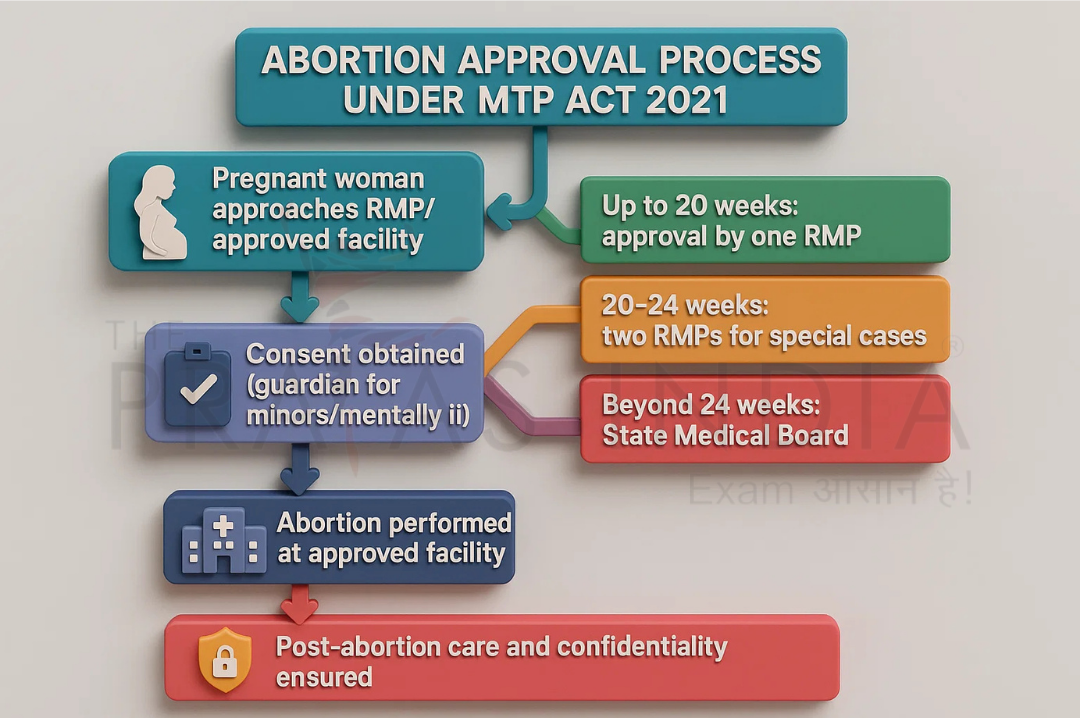Abortion Law in India: Evolution, Rights, and Contemporary Issues
Prelims: MTP Act 1971, MTP (Amendment) Act 2021, relevant Supreme Court cases, PCPNDT Act, Articles 21/14/15.
Mains (GS 2): Federalism, rights and reforms in health policy, case studies on gender justice, state implementation challenges.
Essay: “Reproductive rights are human rights” and themes on women’s empowerment, ethics, and law.
Introduction
Abortion refers to the medical termination of pregnancy. In India, the regulation of abortion is deeply intertwined with debates around women’s reproductive rights, ethical dilemmas of life and autonomy, and the country’s socio-cultural context. The central legal framework—the Medical Termination of Pregnancy (MTP) Act, 1971 (as amended in 2021)—reflects decades of balancing public health, medical ethics, and evolving gender justice.
Historical Background
Criminalization under the Indian Penal Code
Prior to 1971, Sections 312–316 of the IPC (1860) criminalized abortion, permitting it only if the mother’s life was endangered. Both self-induced and assisted abortions were punishable, with severe penalties (up to 10 years imprisonment).
The Shantilal Shah Committee and MTP Act, 1971
Liberalization began with the Shantilal Shah Committee (1964), set up to examine the need for legal abortions. Its findings—focusing on reducing maternal mortality from unsafe abortions and aligning with WHO recommendations—led to the Medical Termination of Pregnancy (MTP) Act, 1971, a landmark step in women’s reproductive health rights in India.

Medical Termination of Pregnancy (MTP) Act, 1971
The MTP Act, 1971, legalized abortion under certain conditions, making India one of the first developing countries to do so.
Key Provisions
- Permissible Grounds: Abortion is legal if continuing the pregnancy:
- Poses a risk to the mother’s life.
- May cause grave injury to her physical or mental health.
- Is due to rape or contraceptive failure (initially for married women).
- Is likely to result in serious fetal abnormality.
- Gestation Limits: Pregnancy could be terminated:
- Up to 12 weeks: On the opinion of one registered medical practitioner (RMP).
- 12–20 weeks: On the opinion of two RMPs.
- Approval and Procedure:
- Only approved facilities and qualified RMPs can perform abortions.
- Written consent (and guardian’s consent for minors/mentally ill) is mandatory.
Limitations
- Did not explicitly address unmarried women’s rights in contraceptive failure.
- No clear provision for abortions beyond 20 weeks, except where necessary to save the mother’s life.
MTP (Amendment) Act, 2021
The MTP Amendment Act, 2021, made the law more progressive, addressing medical advances and judicial pronouncements.
Major Changes
- Extended Gestation Limit: Abortion permitted up to 20 weeks for all women (on one doctor’s opinion) and up to 24 weeks for special categories—rape/incest survivors, minors, differently-abled women (requires two doctors).
- Beyond 24 Weeks: In the case of substantial fetal abnormalities, abortion can be approved by a state-level Medical Board.
- Marital Status: Access to abortion for failure of contraception extended to unmarried women.
- Confidentiality: Section 5A mandates strict confidentiality of a woman’s identity, with violations punishable by law.
- Medical Boards: State/UT Medical Boards constituted to decide on late-term abortions.
Judicial Interventions
Indian courts have consistently expanded the scope of reproductive rights and autonomy:
Key Judgments
- Suchita Srivastava v. Chandigarh Administration (2009):
- Recognized a woman’s reproductive choice as a dimension of personal liberty under Article 21 (Right to Life and Personal Liberty).
- Affirmed bodily autonomy, privacy, and dignity.
- Murugan Nayakkar v. Union of India (2017):
- Allowed a rape survivor to terminate a 32-week pregnancy, stressing the need for compassionate judicial review in exceptional cases.
- X v. Principal Secretary, Health and Family Welfare Dept. (2022):
- Supreme Court held that unmarried women have equal rights to abortion as married women, expanding the inclusive interpretation of the MTP Act.
- Other Orders: The 2022 Supreme Court judgment affirmed that minor rape survivors, women with fetal anomalies, and others have a right to medical termination, upholding non-discrimination and gender justice.
Ethical, Medical, and Social Dimensions
Ethical Debate
- Mother vs. Fetus: Balancing the mother’s autonomy with the fetus’s right to life remains an ethical dilemma. Public discourse often pits religious, moral, and pro-choice arguments.
- Doctor’s Discretion: Strikes a balance between the pregnant woman’s rights and responsible medical practice.
Medical Aspects
- Safe Access: Unsafe abortions are a major cause of maternal mortality, especially in rural and low-resource contexts.
- Shortage of Providers: There are insufficient certified providers and approved facilities, limiting rural access.
- Need for Counseling: Pre- and post-abortion counseling, informed consent, and follow-up care are often lacking.
Social Challenges
- Stigma: Abortion is stigmatized, especially for unmarried women and minors.
- Gender Discrimination: Sex-selective abortions persist, though the PCPNDT Act (1994) outlaws prenatal sex determination.
Implementation Issues
- Poor awareness among women, particularly in rural areas.
- Provider bias and refusal to perform abortions for unmarried women or minors.
- Misuse of abortion law for clandestine sex-selective practices.
- Inadequate training and distribution of certified RMPs and facilities.
- Delayed approvals from Medical Boards for late-term abortions.
International Comparison
- India’s Law: Among the more liberal in developing nations, permitting abortion on broad grounds up to 20–24 weeks.
- USA: After the overturning of Roe v. Wade, abortion laws vary by state, with several outright bans.
- Ireland: Legalized abortion by referendum in 2018 after decades of strict prohibition.
- Poland: Highly restrictive, only allowed in extremely limited cases.
- WHO/UN Stance: WHO and CEDAW advocate safe abortion as part of reproductive health and women’s rights, emphasizing non-discrimination and universal access.
Constitutional and Human Rights Perspective
- Article 21: Right to life and personal liberty—includes reproductive autonomy.
- Article 14 & 15: Equality before law and non-discrimination on basis of gender/marital status.
- Reproductive Rights: Encompass access to safe, legal abortion; international treaties bolster India’s commitment to women’s bodily autonomy.
Conclusion
India’s abortion law has evolved from a punitive, criminal framework to a progressive, rights-based system. The challenge now is to ensure awareness, safe access, non-discriminatory implementation, and adequate healthcare support, so that “true empowerment lies in the freedom to make informed choices over one’s body and life.”
Quote: “Reproductive rights are human rights.”
Timeline of Abortion Law Evolution in India
| Year | Event |
|---|---|
| 1860 | IPC Sections 312–316: Criminalization of abortion |
| 1964 | Shantilal Shah Committee recommends reform |
| 1971 | Medical Termination of Pregnancy (MTP) Act enacted |
| 1994 | PCPNDT Act bans sex-selective abortion/diagnostics |
| 2002–17 | Judicial expansion of abortion rights; late-term cases |
| 2021 | MTP (Amendment) Act: Gestation extended to 24 weeks, single women included, Medical Boards introduced |
FAQs
Q1: Is abortion legal in India?
Yes, abortion is legal in India under the Medical Termination of Pregnancy (MTP) Act, 1971, with expanded rights and broader criteria set out by the MTP (Amendment) Act, 2021.
Q2: Up to what gestational age is abortion allowed in India?
Abortion is permitted up to 20 weeks for most cases, and up to 24 weeks for special categories (rape survivors, minors, differently-abled women, etc.). Beyond 24 weeks, it is permitted only in cases of substantial fetal abnormality, with State-level Medical Board approval.
Q3: Can unmarried women access abortion services under Indian law?
Yes, the MTP (Amendment) Act, 2021, explicitly includes unmarried women; both married and unmarried women can terminate pregnancy on grounds of contraceptive failure and other permitted reasons.
Q4: Who can perform a legal abortion in India?
Only registered medical practitioners (RMPs) at government-approved or recognised private hospitals and clinics are legally authorized to perform abortions.
Q5: What are the main grounds for permitting abortion under Indian law?
Permitted grounds include protecting the mother’s physical or mental health, fetal abnormalities, pregnancies resulting from rape/incest, and contraceptive failure (for both married and unmarried women).
Q6: Is the woman’s consent required for abortion?
Yes, for adults, only the woman’s written consent is required. For minors (under 18) or mentally ill women, consent of a guardian is mandatory.
Q7: What are the major challenges in accessing safe abortion in India?
Barriers include lack of awareness, social stigma, shortage of certified providers and facilities, delays in medical board decisions for late-term abortions, and misuse of the law for sex-selective abortions despite the PCPNDT Act.
Q8: How do India’s abortion laws compare internationally?
India’s abortion laws are considered relatively liberal, especially after the 2021 amendment, compared to many countries that impose greater restrictions or outright bans.








